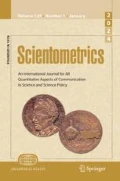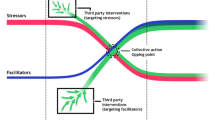Abstract
This paper maps the domain of earth and environmental sciences (EES) and investigates the relationship between cognitive problem structures and internationalisation patterns, drawing on the concepts of systemic versus cumulative global environmental change (GEC) and mutual task dependence in scientific fields. We find that scientific output concentration and internationalisation are significantly higher in the systemic GEC fields of Meteorology & Atmospheric Sciences and Oceanography than in the cumulative GEC fields Ecology and Water Resources. The relationship is explained by stronger mutual task dependence in systemic GEC fields. In contrast, the portion of co-authorships with developing, emerging and transition countries among all international publications is larger for Water Resources than for the three other fields, consistent with the most pressing needs for STI capacity development in these countries.
Similar content being viewed by others
References
Bocking, S. (1997), Ecologists and Environmental Politics: A History of Contemporary Ecology, Yale University Press, New Haven, CT.
Bressers, H., Kuks, S. (2004), Integrated Governance and Water Basin Management. Conditions for Regime Change Towards Sustainability, Kluwer Academic Publishers, Dordrecht.
Carson, D. J. (2005), Introduction to the international GEC Programmes & their Earth System Science partnership, Presentation at IGFA — ICSU Workshop on the Interface Between Global Change and Development-Oriented Research. 17–19 May 2005. Uppsala, Sweden.
Cash, D. W., Clark, W. C., Alcock, F., Dickson, N. M., Eckley, N., Guston, D. H., Jäger, J., Mitchell, R. B. (2003), Knowledge systems for sustainable development, Proc. Natl. Acad. Sci. USA, 100: 8086–8091.
Cox, P. M., Nakicenovic, N. (2004), Assessing and simulating the altered functioning of the earth system in the anthropocene. In: Schellnhuber et al. (Eds), Earth System Analysis for Sustainability, MIT Press, Cambridge, MA. pp. 293–311.
Dahdou-Guebas, F., Ahimbisibwe, J., van Moll, R., Koedam, N. (2003), Neo-colonial science by the most industrialised upon the least developed countries in peer-reviewed publishing, Scientometrics, 56: 329–343.
Dastidar, P. B. (2004), Ocean science & technology research across the countries: A global scenario, Scientometrics, 59: 15–27.
Edwards, P. N. (2001), Representing the global atmosphere: Computer models, data and knowledge about climate change. In: C. A. Miller, P. N. Edwards (Eds), Changing the Atmosphere: Expert Knowledge and Environmental Governance. MIT Press, Cambridge, MA.
Edwards, P. N. (2004), “A Vast Machine”: Standards as social technology, Science, 304: 827–828.
Engels, A., Ruschenburg, T., Weingart, P. (2005), Recent internationalization of global environmental change research in Germany and the U.S., Scientometrics, 62: 67–85.
European Commission (2003), Third European Report on Science & Technology Indicators, Office for Official Publications of the European Communities, Luxembourg.
Glänzel, W., Schubert, A. (2004), Analysing scientific networks through co-authorship. In: H. F. Moed, W. Glänzel, U. Schmoch (Eds), Handbook of Quantitative Science and Technology Research. Kluwer Academic Publishers, Dordrecht, pp. 257–276.
Glänzel, W., Schubert, A. (2005), Domesticity and internationality in co-authorship, references and citations, Scientometrics, 65: 323–342.
Golley, F. B. (1993), A History of the Ecosystem Concept in Ecology: More than the Sum of the Parts, Yale University Press, New Haven, CT.
Greenaway, F. (1996), Science International — A History of ICSU, Cambridge University Press, Cambridge.
Grupp, H. (1998), Foundations of the Economics of Innovation: Theory, Measurement and Practice, Edward Elgar, Cheltenham, UK.
Hamblin, J. D. (2005), Oceanographers and the Cold War. Disciples of Marine Science, Washington University Press, Seattle, WA.
Heinze, T. (2004), Nanoscience and nanotechnology in Europe: Analysis of publications and patent applications including comparisons with the United States, Nanotechnology Law & Business, 1: 427–447.
Heinze, T. (2006), Die Kopplung von Wissenschaft und Wirtschaft. Das Beispiel der Nanotechnologie, Campus, Frankfurt, New York.
Jappe, A. (2005), International Collaboration Schemes in Earth and Environmental Sciences: IGEC Programmes and Unesco IHP, Fraunhofer ISI Discussion Papers Innovation System and Policy Analysis, No 5/2005.
Intergovernmental Panel on Climate Change IPCC (2001), Climate Change 2001. The Scientific Basis. Third Assessment Report of the Intergovernmental Panel on Climate Change, Cambridge University Press, Cambridge, New York.
Mooney, H. A. (1998), The Globalization of Ecological Thought, Ecology Institute, Oldendorf/Luhe.
National Science Board (NSB), Science and Engineering Indicators, National Science Foundation, Arlington. Reports 2004 and 2000.
Resh, V. H., Yamamoto, D. (1994), International collaboration in freshwater ecology, Freshwater Biology, 32: 613–624.
Reuss, M. A. (2003), Geomorphology and the rise of modern hydrology, Paper presented at the Third Annual Meeting of the International Water History Association (IWHA), 11–14 Dec. 2003.
Sagasti, F. (2004), Knowledge and Innovation for Development: The Sisyphus Challenge for the 21st Century, Edward Elgar, Cheltenham, UK.
Schellnhuber, J., Crutzen, P. J., Clark, M., Claussen, M., Held, H. (Eds) (2004), Earth System Analysis for Sustainability, MIT Press, Cambridge, MA.
Steffen, W., Tyson, P., Jäger, J., Matson, P. A., Moore, B., Oldfield, F., Richardson, K., Schellnhuber, J., Turner, B. L., Wasson, R. (2001), Earth systems science. An integrated approach, Environment, 46(3): 8–20.
Stichweh, R. (1999), Globalisierung von Wirtschaft und Wissenschaft. Produktion und Transfer wissenschaftlichen Wissens in zwei Funktionssystemen der modernen Gesellschaft, Soziale Systeme, 5: 27–40.
Turner, B. L., Kasperson, R. E., Meyer, W. B., Dow, K. M., Golding, D., Kasperson, J. X., Mitchell, R. C., Ratick, S. J. (1990), Two types of global environmental change: Definitional and spatial-scale issues in their human dimension, Global Environmental Change, 1: 14–22.
Turner, B. L., McCandless, S. (2004): How humankind came to rival nature. In: Schellnhuber et al. (Eds), Earth System Analysis for Sustainability, MIT Press, Cambridge, MA. pp. 226–243.
Vitousek, P. M. (2004), Nutrient Cycling and Limitation: Hawai’i as a Model System, Princeton University Press, Princeton, NJ.
Wagner, C. S. (2005), Six case studies of international collaboration in science, Scientometrics, 62: 3–26.
Weart, S. R. (2004), The Discovery of Global Warming, Harvard University Press, Cambridge, MA.
Weart, S. R. (2005a), General circulation models of the atmosphere. Essay in the Web Site “The Discovery of Global Warming”: Spencer Weart & American Institute of Physics.
Weart, S. R. (2005b), International cooperation. Essay in the Web Site “The Discovery of Global Warming”: Spencer Weart & American Institute of Physics.
Whitley, R. (1984), The Intellectual and Social Organization of the Sciences, Clarendon, Oxford, UK.
Wishart, M. J., Davies, B. R. (1998), The increasing divide between first and third worlds: Science, collaboration and conservation of third world aquatic ecosystems, Freshwater Biology, 39: 557–567.
Author information
Authors and Affiliations
Corresponding author
Rights and permissions
About this article
Cite this article
Jappe, A. Explaining international collaboration in global environmental change research. Scientometrics 71, 367–390 (2007). https://doi.org/10.1007/s11192-007-1676-1
Received:
Issue Date:
DOI: https://doi.org/10.1007/s11192-007-1676-1




